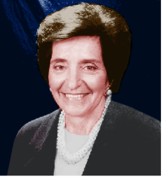
Over the past several years, the Foundation has reported receiving an increased
number of grant requests and in 2006 we once again saw that number escalate. We
reached deep to support many, but gave mainly to those organizations who work closely
with children, keeping with our long-standing mission of primary prevention and
education. Our Foundation will continue, as we have in the past, to keep the focus
on the underlying root cause of most of society's major problems, that is alcoholism.
This is evident in the news media, hospital emergency rooms, crisis centers and court
rooms.
The devastation caused by underage drinking and binge drinking continues to find its way
into more stories and newspaper headlines than ever before. Because of this mushrooming
problem, we must commit to a more concerted effort to reach children as early as possible
and educate them on the dangers of alcohol and other drug abuse. In keeping with this focus,
the Foundation supported since its inception, and in 2006 honored, the Foundation to Keep
Our Children Alcohol Free, with the R. Brinkley Smithers Award. This remarkable organization
founded by the Spouses of Governors is one of the few to dare to use the word alcohol in its
title. It has been stalwart in its concentration to reach and educate children, particularly
in the critical 9 to 15-year old age group. Our Foundation continues to work closely with them
and other organizations such as Derek Jeter's Turn 2 Foundation and The Boys and Girls Clubs of
America in supporting programs that encourage young people to choose healthy lifestyles and avoid
the use and abuse of alcohol and other drugs.
The Foundation's work in 2006 with national as well as international organizations in the field of
alcoholism and addiction emphasizes our commitment to getting the message out that alcoholism is a
respectable and treatable disease from which people can and do recover and that no nation or people
are immune from the dangers posed by this pandemic.
In the coming year, the Foundation plans to support the efforts of smaller grassroots organizations
with which we share a common vision of prevention through education, the path set by our founder, my
late husband, R. Brinkley Smithers.

Adele C. Smithers
President
View the complete Annual Reports by year: 2008 2007 2006.
The year 2002 marked the fiftieth anniversary of the founding on October 21, 1952 of The
Christopher D. Smithers Foundation by R. Brinkley Smithers, my late husband. This historic
milestone is a time for reflection.
Shortly after, Brink himself marked an important date - his sobriety. It was almost fifty
years ago that Yvelin Gardner, Deputy Director of the National Council on Alcoholism, met
with Brink and told him, "Brink, you have a disease and there is treatment for it." These
words changed the direction of Brink's life and the shape of the mission of the Foundation.
It signaled Brink's recovery from alcoholism, his life's dedication to the alcoholism cause
and the start of the Foundation's close working relationship with the National Council on
Alcoholism. It was truly the beginning of the alcoholism movement in this country and
ultimately the world.
The Foundation has made great inroads in the areas of medical and scientific research, in
the reduction in stigma and, we like to think, in the reduction in sales in the license
beverage industry. The highlights of the major initiatives are included in the body of
this report. It is evident from reading them that the Foundation has been the motivating
force for much of the progress made in the field. Treatment became available, education,
prevention and training programs were implemented.
Today, I am perplexed and angry. Despite our accomplishments, we are losing a great deal
of ground. Access to treatment for alcoholics is at best difficult, insurance for treatment
for alcoholics is at best scarce, and in the last decade the stigma and the old myths have
resurfaced. Denial once again is growing. In addition there is evidence of increased
advertising by the licensed beverage industry targeted at the young. Products such as
alco-pops, which are squarely aimed at the young, have been introduced and hard liquor ads
are reappearing on television. Underage drinking is on the rise, binge drinking on college
campuses and drinking among the elderly are at an all time high.
In these same fifty years, our society has accepted and substantially funded the treatment
of other diseases including cancer, diabetes, asthma, high blood pressure and HIV/AIDS.
Alcoholism has not shared in our society's increasing awareness of the concept of disease.
Although the entire world is affected by this disease, it is still looked upon as a moral
weakness, not as a chronic medical condition.
Recently the World Health Organization declared alcohol and alcohol abuse the number one
health threat to society. It is, as we know, and they confirm, a disease that touches more
lives than all other diseases combined. The realization and concern of the international
community of the escalating problems caused by alcoholism gives us great hope that working
together we can go forward, regain lost ground and conquer this disease.
I am proud to have been a part of the accomplishments in the field of alcoholism since 1960
when I joined the National Council on Alcoholism, and I wish to pay tribute to Brink for his
visionary leadership and compassionate philanthropy. He gave his all to the cause and enjoyed
doing so. I would like to express my heartfelt gratitude to all those organizations and
individuals with whom we have worked and from whom I have learned so much. A special thanks to
past and particularly present Board members and Consultants of the Foundation.
In retrospect, I embrace all the past relationships we have had with those dedicated individuals
who have been in the pioneering forefront of this movement. Looking to the future, I dedicate
myself and the Foundation to the mission set by our Founder, R. Brinkley Smithers "to create a
better understanding of this baffling, complex disease and to have alcoholism recognized as a
respectable, treatable disease from which people can and do recover.

Adele C. Smithers
President
|







